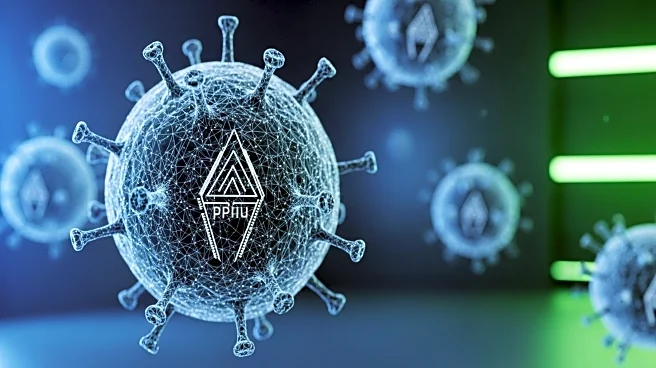What's Happening?
Scientists have successfully created the first viruses designed by artificial intelligence (AI), capable of targeting and killing strains of Escherichia coli (E. coli). The study, conducted by researchers including Brian Hie and Samuel King, utilized AI models Evo 1 and Evo 2 to generate viral genomes with the specific function of infecting antibiotic-resistant E. coli strains. The AI-designed bacteriophages were synthesized and tested, with 16 out of 302 showing host specificity for E. coli, demonstrating their ability to infect and kill the bacteria. This development marks a significant step in using AI to design biotechnological tools and therapies for bacterial infections, potentially complementing existing phage-therapy strategies.
Why It's Important?
The creation of AI-designed viruses represents a breakthrough in biotechnology, offering new avenues for treating bacterial infections, particularly those resistant to antibiotics. This innovation could significantly impact public health by providing alternative therapeutic options, reducing reliance on traditional antibiotics, and addressing the growing issue of antibiotic resistance. The ability to design viruses with specific functions using AI could lead to more targeted and effective treatments, benefiting healthcare systems and patients worldwide. However, it also raises biosafety concerns that need to be addressed as the technology advances.
What's Next?
Further experimental advances are necessary to design entire living organisms using AI, as noted by Samuel King. The study's authors suggest that AI-designed viruses could eventually augment existing therapeutic strategies to target pathogens of concern. Continued research and development in this field are expected, with potential collaborations between biotechnologists and AI experts to refine and expand the applications of AI in designing viral genomes. Regulatory and ethical considerations will also play a crucial role in the future deployment of AI-designed viruses in clinical settings.
Beyond the Headlines
The use of AI in designing viral genomes highlights the intersection of technology and biology, potentially leading to long-term shifts in how biotechnological tools are developed. Ethical considerations regarding the manipulation of biological systems and the potential risks associated with AI-designed organisms will need to be carefully evaluated. This development also underscores the importance of interdisciplinary collaboration in advancing scientific research and addressing complex global health challenges.










